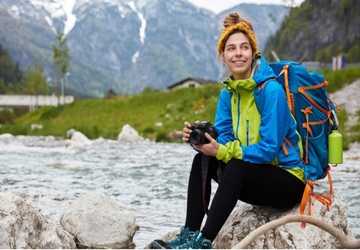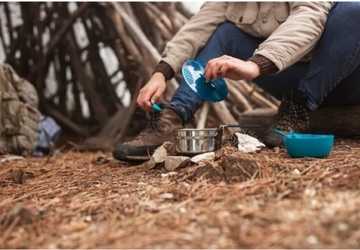Starting a solo trip is exciting, as you are on a new adventure and learning something new. Out of all the myriad advantages of solo travel, one that many people remember is self-cooking. It is a skill that not only keeps your wallet fat but also helps you enjoy local cuisines and feel at home in strange environments. This article will cover ten helpful tips for solo travellers cooking food on the road.
Pack the Essentials

Let's begin with the essential equipment, shall we? A compact and portable food cooking set may be the one to get you going. For the essentials, you need a small pot, a frying pan, a sharp knife, a cutting board, and utensils like a spatula and spoon. Choose stainless steel or titanium, which is lightweight and durable. Also, don't forget to bring salt, pepper, and cooking oil. Use vacuum or compression bags to minimize the space these items occupy in your bag.
Plan Simple Recipes
Aim for simplicity while your recipes are flavorful and filling. Think of one-pot meals such as rice, stir-fries, and salads. Pasta is also simple to make with a few easily found-ingredients. Think about meals that require fewer ingredients but still provide a good balance of nutrition. For example, a stir-fry of quinoa and vegetables or a salad with a simple vinaigrette dressing can be both nutritious and tasty.
Shop Local
Travelling is one of the most exciting hobbies for many people. Markets are a place where all of us can feel the local spirit. Use this opportunity to choose fresh and seasonal ingredients. Apart from that, this is a good chance for you to get an idea of the area's cuisine too. Seek the fresh fruits, vegetables, meats, and spices typical in the local food. Testing new ingredients will spice up your daily diet.
Master One-Pan Cooking
One-pan cooking is a crucial ingredient in the solo traveller's survival kit. It's fast and efficient, and it's barely messy at all. Begin with some oil heating in your pan, then add the protein (like chicken, tofu, or shrimp) and cook it until browned. Take out the protein and set it aside. Then, sauté your veggies until they are tender. Add cooked grains, like rice or quinoa, to the mix, and then use some spices and sauces. In the end, return to the protein, mix everything up again, put it back in the pan, and heat through. Voila! A delicious, all-in-one meal.
Embrace Meal Prep
Preparing meals in advance might take a while, but it is worth it because you will save yourself lots of trouble. Take an hour or so of your time now and then to chop vegetables, marinate meat, or cook grains in advance. Use reusable containers for the prepared ingredients and keep them in your accommodation fridge. When you're hungry, combine your prepped ingredients for a simple and delicious meal. If you're on the go, short on time, or simply want to avoid the fuss, this is your go-to.
Utilize Local Resources

Make use of amenities provided by your accommodation. A significant share of hostels, guesthouses, and Airbnb rentals have communal kitchens for guests. These kitchens are designed with the most basic cooking gadgets and tools, so it will be easy for you to prepare a meal. Some accommodations provide you with spices and condiments for free. Therefore, ask the staff about what is free in the accommodation.
Opt for No-Cook Meals
You may not want to cook or have access to a kitchen sometimes. In such cases, opt for non-cooking meals. Prepare rice or quinoa packets, beans, tuna or salmon in a can, salad greens already washed, and cut vegetables. Add these ingredients to your favourite salads or wraps or make cold grain bowls. In addition, you can have some simple snacks, such as cheese and crackers, hummus and vegetables, or yoghurt with fruit.
Learn Basic Cooking Techniques
On the contrary, you don't have to be a professional chef to get decent meals, but a couple of basic cooking skills can help you prepare better food. Learn how to cut vegetables, cook grains such as rice and pasta, fry meat or tofu, and create sauces or dressings. Online sources such as tutorials and cooking apps can give you the skills to handle these tasks.
Stay Organized
The tidy and well-ordered cooking space will help your meal preparation to go much faster. Keep your workspace neat while you work to reduce cleaning time later. Keep leftovers and prepped foods in reusable containers. Labelling your containers is important so that you can easily find out what's inside them, especially if you are sharing the kitchen space with others.
Connect with Locals
Communication through the cooking process is also possible while travelling alone. Try out cooking classes or food tours that you'll find in the neighbourhood. You can't only learn new recipes and cooking methods, but you'll also be able to meet locals and fellow travellers who are just like you, and they like food, too. I often learn a lot about the food and the culture, and I have the chance to experience those moments.
Conclusion
Travelling alone and cooking is not only to satisfy hunger; it is a chance to connect with local culture, save money, and have tasty meals designed to your tastes. With the right essentials packed, simple recipes prepared, shopping locally, one-pan cooking mastered, meal prep embraced, local resources utilized, no-cook meals opted for, basic cooking techniques learned, and connection with the locals established, you can turn cooking into an enriching and enjoyable part of your solo expeditions. Whether in a busy city or a rural village, these tips make your food adventure as unforgettable as the places you explore, away with a smiling face and a taste of two worlds.
Related Posts
life style
life style
life style
deliciousfood
life style
life style